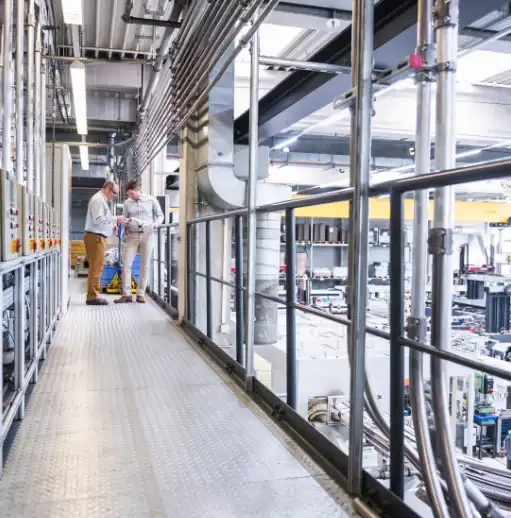
In today’s workplace, space is no longer just about square footage — it’s about enabling flexibility, collaboration, and productivity.
Despite studies showing that 34% of organizations plan to increase office attendance, hybrid work is still very much so in the picture. Still, office occupancy trends are more fluid than ever, and how we book and manage space has become a crucial part of employee experience and operational efficiency.
But for many enterprises, what seems like a simple process — reserving a room — can quickly turn into a logistical headache. Bookings get double-booked. Teams can’t find available meeting space. Rooms sit empty because someone forgot to cancel a reservation. IT support is overwhelmed by fragmented systems that don’t talk to each other.
It’s not just frustrating. It’s expensive, inefficient, and damaging to both culture and performance.
If your organization is looking to implement or upgrade a meeting room booking system, it’s not about checking boxes. It’s about choosing a scalable, intelligent platform that solves for the complexities of the modern workplace — and sets your teams up for long-term success.
Here’s how leading enterprises are reframing the question — and why a truly effective room booking solution involves both strategy and software.
The booking bottleneck
Increasingly, enterprises are discovering a new kind of space problem: it’s not just about having enough rooms — it’s about whether people can use them when and how they need to.
In a world where some employees are in the office two days a week, others five, and still others once a month, scheduling becomes a delicate balancing act. Booking platforms that aren’t purpose-built for this level of complexity quickly become blockers, not enablers.
If you’ve ever tried to hold a cross-functional team meeting only to find that every meeting room is mysteriously “booked” but mostly empty, you already understand the issue.
The pain points typically fall into a few categories:
- Lack of real-time availability and visibility
- Inconsistent or clunky user experience
- No integration with workplace tools (like Outlook or Teams)
- Poor space utilization data
- No way to manage no-shows, double-bookings, or ghost meetings
These issues seem small until they scale across multiple offices, regions, or thousands of employees. Then they start to impact workflows, waste valuable real estate, and erode the very flexibility that hybrid work was meant to enable.
Rethinking what room booking really means
Booking a room is never just about the room. It’s about making it easier for people to do their best work — whether they’re planning a brainstorming session, hosting clients, or jumping on a global video call.
That’s why the most effective enterprise room booking solutions don’t think about space in isolation. They think about it as part of a broader ecosystem: your people, your culture, your tools, and your goals.
The right solution should enable seamless scheduling across locations, provide valuable insights into how space is actually used, and reduce administrative overhead for both employees and facilities teams.
It’s not just about solving today’s scheduling headaches — it’s about future-proofing your workplace strategy.
What enterprises need in a booking platform
Let’s be honest: most room booking tools can reserve a space. That’s the bare minimum. What sets a truly enterprise-ready platform apart is its ability to anticipate needs, connect data, and scale with you.
At the heart of this lies integration. Room booking software shouldn’t be another silo. It should integrate with your calendar tools, occupancy sensors, visitor systems, and mobile devices to deliver a unified experience.
Consider how valuable it is when someone books a meeting and the system automatically:
- Reserves the appropriate room based on number of attendees and equipment needs
- Sends calendar invites with the room details included
- Cancels the booking if no one checks in within 10 minutes
- Frees up the space for others, in real time
These are table stakes for large organizations trying to run high-performing workplaces across multiple time zones and hybrid policies.
Even more important? Data.
With the right platform, enterprises can analyze how space is used — not how it’s booked. That distinction is critical. Just because a room is reserved doesn’t mean it’s being used.
Understanding occupancy patterns, peak usage times, and even which types of meetings are most frequent helps real estate and workplace leaders make more informed decisions about how to optimize their office layouts, lease terms, and long-term planning.
When the system gets smarter, so does the workplace
At Eptura, we’ve worked with some of the world’s largest and most dynamic companies. And across every industry, the need is the same: make space work smarter. Not harder.
Rendall & Rittner, a leading UK property management company and part of the Odevo Group, needed to rethink how their office space supported a mobile, hybrid workforce. With over 2,000 employees across six offices and many team members frequently off-site, fixed desk assignments were leading to inefficiencies, underutilized real estate, and increased costs — especially in their large central London office.
To modernize their approach, Rendall & Rittner implemented Eptura’s workspace booking solution, complete with desk and meeting space reservation features, mobile app access, QR code check-ins, and seamless integration with Microsoft 365. These tools not only simplified daily coordination and space usage but enabled teams to collaborate more effectively with features like the “team day” function.
The results were immediate and impactful. With access to space utilization data, they optimized their footprint by moving from a large central hub in Aldgate to several smaller, strategically located offices. In one case, insights from the data led to a redesign of their Vauxhall location to include more collaboration zones and client-facing areas. The shift drove higher employee satisfaction and productivity while significantly reducing real estate costs.
Want to see the full story of how Rendall & Rittner used Eptura to power flexible work and smarter space decisions? Read the full case study here.
Looking ahead: Room booking as strategic infrastructure
The conversation around room booking systems is evolving. It’s no longer just about operational convenience. It’s about enabling culture, supporting inclusion, and making the most of every square foot.
A modern booking solution needs to support flexible work, encourage collaboration, and align with ESG goals by helping organizations reduce wasted space and energy.
Most importantly, it needs to grow with you.
As your organization adapts, merges, or expands into new markets, your booking platform should be ready to scale — without sacrificing simplicity or insight.
At the end of the day, a meeting room isn’t just four walls and a whiteboard. It’s where ideas happen. Where deals get closed. Where culture is built.
And the better your people can access that space, the better your organization performs.
Final thoughts: Don’t settle for “good enough”
If your current booking system is “working” but not solving real problems, it may be time to reevaluate.
The best enterprise room booking solution doesn’t just book rooms — it creates a more agile, data-driven, people-first workplace. It turns every meeting into a moment that just works.
Find out more about how you can become a data-driven, people-first workplace with Eptura Engage (Condeco).








